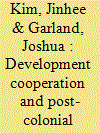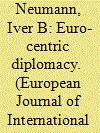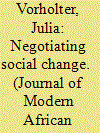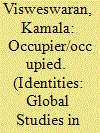| Srl | Item |
| 1 |
ID:
167052


|
|
|
|
|
| Summary/Abstract |
With the rise of the South–South Development Cooperation (SSDC), the international development community has entered into a new paradigm of development cooperation. The Organisation for Economic Co-operation and Development – Development Assistance Committee (OECD-DAC) has had to consider what recently added members might have to offer, particularly South Korea given its dramatic transformation from official development assistance (ODA) recipient to donor. Post-colonial theory sees ODA as a system that reinforces the traditional hierarchy of North–South relations and reaffirms the hegemony of dominant countries; the SSDC has faced similar neo-colonial allegations. By employing post-colonial theory this paper investigates some neo-colonial criticisms of the ODA activities of major OECD-DAC and SSDC providers, before turning its focus on those of South Korea to determine whether it does indeed offer an alternative strategy to development. The African region was chosen as the focus in light of the increased amount of aid South Korea has allocated to the region. This paper concludes by offering a different role South Korea might play engaging within the OECD-DAC/SSDC context.
|
|
|
|
|
|
|
|
|
|
|
|
|
|
|
|
| 2 |
ID:
113809


|
|
|
|
|
| Publication |
2012.
|
| Summary/Abstract |
Drawing on the work of cultural anthropologists Clifford Geertz and Marshall Sahlins, I suggest a layered conceptualization of diplomacy as consisting of myths, sociabilities and practices which allows us to open the question of diplomacy's Euro-centrism to empirical scrutiny. As do all known diplomatic systems, European diplomacy has its roots in the social systems of kinship and religion. It is rooted in Christian mythology, and this mythology informs its sociabilities and practices. Three mini-case studies (of diplomatic immunity, permanent representation and the institution of dean of the corps diplomatique) demonstrate that this mythology shines through in present-day diplomacy as well. Since diplomatic practices bear the mark of a European cultural context, it privileges the life chances of those native to that context. In this sense, diplomacy is Euro-centric. I then go on to argue that, empirically, this does not seem to be a particularly pressing problem. The real problem may be external to diplomacy itself, and concern the idea that European diplomacy was uniquely peaceful. As I demonstrate by means of a mini-study of Iroquois diplomacy, this is simply not the case. If the erroneous idea of uniquely peaceful European diplomacy is paired up with a framing of relations between European and non-European polities in terms of peaceful diplomacy, the result may easily be that we occlude other aspects of those relations, such as conquest and colonialization. The Euro-centrism of diplomacy that matters is thus less to do with diplomatic practices than with mnemonic practices about diplomacy.
|
|
|
|
|
|
|
|
|
|
|
|
|
|
|
|
| 3 |
ID:
096063


|
|
|
| 4 |
ID:
113179


|
|
|
|
|
| Publication |
2012.
|
| Summary/Abstract |
A common claim, in public discourses and in post-colonial theory, is that colonialism, and more recently the aid industry and the media, have created global hegemonic norms, which have been enforced on non-Western societies. While this may be true in some respects, this article takes a different stance on the debate. It scrutinises perceptions of Western-influenced social change in Uganda, and differentiates between discourses on Westernisation and discourses on neo-colonialism. Both are analysed as forms of social critique - one internally and the other externally oriented. The largely elitist discourse on neo-colonialism is explicitly critical of the West and its interventions in Uganda. But it is not representative of the more ambiguous perceptions of Westernisation among 'ordinary' people, who use references to the West to comment on contemporary Ugandan society. The article is based on empirical research in Northern Uganda. It focuses on discourses on gender, kinship and sexuality, and the recent debate on homosexuality.
|
|
|
|
|
|
|
|
|
|
|
|
|
|
|
|
| 5 |
ID:
116578


|
|
|
|
|
| Publication |
2012.
|
| Summary/Abstract |
As military occupation increasingly informs the politics of both democracies and dictatorships, capitalist and socialist regimes, this essay asks why it is foundational for sovereignty and the post-war state-form. In particular, it questions the complicity of post-colonial theory with security discourses in reading movements for self-determination as threats to the state or as forms of terrorism rather than as alternate possibilities for freedom and liberty. It suggests not only that the ongoing twenty-first century relations between occupier and occupied reprise the racialised forms of identity that characterised relations between coloniser and colonised in the preceding two centuries, but also that relations between occupied peoples may produce affiliative poetics and shared terms of political reference or solidarity.
|
|
|
|
|
|
|
|
|
|
|
|
|
|
|
|